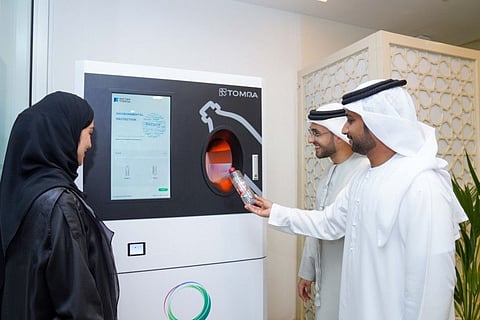DEWA provides smart machines to recycle plastic bottles
DEWA’s employees recycled 221,900 plastic bottles and aluminium cans

Dubai: Dubai Electricity and Water Authority (DEWA) has provided smart machines to recycle plastic bottles in some of its buildings. This is keeping in line with its importance on environmental sustainability across all its projects, and its vision to become a globally leading sustainable innovative corporation committed to achieving Net Zero by 2050.
DEWA’s machines are operated using DEWA’s Smart Office app for employees. The device reads the QR code on the smart app, and the employee receives points for each recycling operation, which are entered into a raffle draw to win valuable monthly prizes. Since installing the smart machines in October 2022 until the end of April 2023, DEWA’s employees recycled 221,900 plastic bottles and aluminium cans, which were used to produce over 11,600 T-shirts and other products by a local company using sustainable manufacturing solutions.
Protecting the environment is a top priority for DEWA, which aims, during the Year of Sustainability, to increase awareness among employees and customers on the need to care for the environment, preserve natural resources, and adopt sustainable practices at home and in the workplace.
Smart Recycling Machines
The initiative supports the circular economy model and its application in various sectors, contributing to economic growth in parallel with protecting the environment. It also encourages sustainable practices by reusing resources, reducing waste and reducing emissions to contribute to combating climate change. The initiative aligns with the Dubai Integrated Waste Management Strategy 2021-2041, which seeks to encourage innovation in waste management and recycling as well as converting waste to energy, in addition to providing practical solutions to environmental challenges.
Circular Economy Strategy
The initiative is also in line with DEWA’s Circular Economy Strategy, which aims to optimise the use of resources and enrich social, economic, and environmental value, promoting sustainability in the UAE and Dubai. The strategy adopts five principles: Circular Design and Use of Circular Material; Optimised Asset Management; Value Retention and End-of-Life Treatment; Renewable Energy, Energy, and Water Efficiency; and Circular Partnerships. The strategy highlights DEWA’s value chain, including smart users, circular procurement and supplier engagement.


